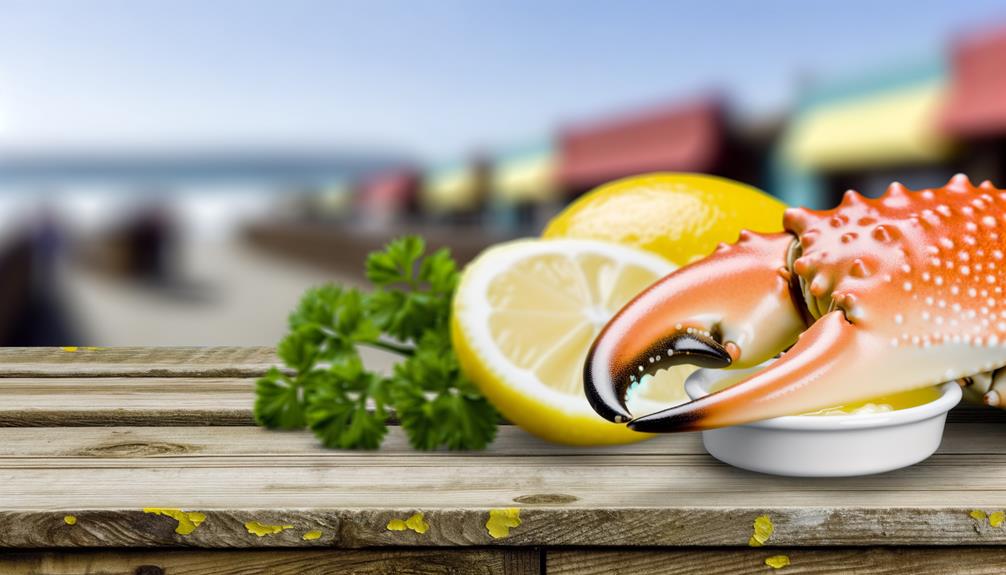Assessing High Cholesterol in Stone Crabs
Stone crabs contain a moderate amount of cholesterol, with around 75 mg per 3-ounce serving. This falls within a reasonable range compared to other seafood like shrimp or lobster.
The American Heart Association suggests a daily limit of 300 mg for healthy adults, so you can enjoy stone crabs in moderation as part of a balanced diet. Stone crabs are also high in protein, vitamins, and omega-3 fatty acids, offering numerous health benefits.
Balancing your intake with low-cholesterol foods is key. For detailed insights on incorporating stone crabs into your diet effectively, keep exploring related nutritional information.

Key Takeaways
- A 3-ounce serving of stone crab meat contains about 75 mg of cholesterol.
- Stone crabs have a mid-range cholesterol level compared to other seafood like shrimp and lobster.
- The American Heart Association recommends a daily cholesterol limit of 300 mg for healthy adults.
- Moderation is key when consuming stone crabs due to their cholesterol content.
- Pairing stone crabs with low-cholesterol foods helps manage overall cholesterol intake.
Understanding Cholesterol
Cholesterol is a type of lipid that your body frequently needs to build cells and produce certain hormones. While it's essential, not all cholesterol is the same. You'll often hear about two types: LDL (low-density lipoprotein) and HDL (high-density lipoprotein).
LDL is known as 'bad' cholesterol because high levels can lead to plaque buildup in your arteries, increasing heart disease risk. HDL is the 'good' cholesterol; it helps remove LDL from your bloodstream.
Your liver produces all the cholesterol you need, but dietary sources can influence your overall levels. Understanding the balance between LDL and HDL is vital for maintaining heart health.
Regular check-ups and a balanced diet are key to managing your cholesterol effectively.
Nutritional Facts of Stone Crabs
You'll find that stone crabs offer a rich nutritional profile, starting with their caloric content, which can impact your dietary balance.
They also provide essential nutrients like protein, vitamins, and minerals that are vital for overall health.
Let's break down these nutritional facts to understand their benefits and implications.
Caloric Content Overview
A 3-ounce serving of stone crab meat contains approximately 60 calories, making it a low-calorie seafood option. This calorie count is relatively low compared to many other seafood choices, making stone crabs an excellent option if you're watching your caloric intake.
The low caloric content allows you to enjoy this delicacy without greatly impacting your daily calorie limit. Additionally, stone crab meat offers a satisfying and nutritious alternative to higher-calorie proteins, helping you maintain a balanced diet.
Essential Nutrient Breakdown
Besides being low in calories, stone crab meat is packed with essential nutrients that contribute to a balanced diet. Each serving provides a good source of high-quality protein, which is vital for muscle repair and growth.
You'll also find significant amounts of vitamins like B12, essential for nerve function and red blood cell production, and minerals such as zinc, which supports immune health.
Additionally, stone crabs offer omega-3 fatty acids, known for their heart health benefits. While they do contain cholesterol, the overall nutrient profile makes them a nutritious option when consumed in moderation.
Cholesterol Content in Stone Crabs
Stone crabs are known for their high cholesterol content, making them a concern for those monitoring their cholesterol intake. A 3-ounce serving of stone crab contains about 75 milligrams of cholesterol. This is significant, considering the American Heart Association recommends a daily limit of 300 milligrams for healthy adults. If you have high cholesterol or heart disease, that limit drops to 200 milligrams.
While stone crabs offer beneficial nutrients like protein and omega-3 fatty acids, their cholesterol content can't be overlooked. Ensuring a balanced diet by incorporating other low-cholesterol foods if you choose to eat stone crabs is crucial.
Always consult with a healthcare provider to determine what's optimal for your individual dietary needs.
Comparing Seafood Cholesterol Levels
When comparing seafood cholesterol levels, understanding how different varieties stack up is essential to make informed dietary choices.
Stone crabs contain about 71 mg of cholesterol per 3-ounce serving. In contrast, shrimp can have around 166 mg per serving, and lobster typically has about 124 mg. Meanwhile, salmon, known for its heart-healthy omega-3s, contains approximately 63 mg per serving.
These numbers highlight significant variations across seafood types. While stone crabs aren't the highest, they're not the lowest either. By comparing these levels, you can better manage your cholesterol intake and choose seafood that aligns with your health goals.
Keep these figures in mind to maintain a balanced and heart-friendly diet.
Health Benefits of Stone Crabs
Rich in protein and essential nutrients, stone crabs offer several health benefits that can support a balanced diet. They're an excellent source of lean protein, which is vital for muscle repair and growth.
Stone crabs are also rich in omega-3 fatty acids, known to reduce inflammation and improve heart health. Additionally, they provide a good amount of vitamins and minerals such as vitamin B12, which aids in nerve function, and zinc, which supports immune health.
The selenium found in stone crabs acts as an antioxidant, helping to protect your cells from damage. Including stone crabs in your diet can contribute to overall well-being by supplying important nutrients that your body needs to function efficiently.
Dietary Recommendations
Given their numerous health benefits, it's important to think about how to incorporate stone crabs into your diet effectively. Aim to include stone crabs as part of a balanced diet, combining them with vegetables, whole grains, and healthy fats.
Consuming seafood, such as stone crabs, twice a week is recommended by dietary guidelines. This helps you benefit from their high-quality protein and omega-3 fatty acids while managing your cholesterol intake. Be mindful of portion sizes, as excessive consumption of any cholesterol-rich food could impact heart health.
Also, consider pairing stone crabs with fiber-rich foods to help balance cholesterol levels. Remember, moderation and variety are key to maintaining a healthy diet.
Cooking Methods and Cholesterol
When preparing stone crabs, the cooking method you choose can have a substantial impact on their cholesterol content. Boiling and steaming are healthier options, as they don't add extra fats, whereas frying increases cholesterol levels due to the oils used.
Steaming, in particular, preserves the nutritional benefits while keeping cholesterol intake low.
Boiling Versus Frying
Choosing between boiling and frying stone crabs greatly impacts their cholesterol levels, with boiling generally being the healthier option. Boiling doesn't add extra fats or oils, preserving the crab's natural nutritional profile. In contrast, frying introduces additional fats, which can elevate cholesterol levels.
Here's a quick comparison:
| Cooking Method | Cholesterol Impact |
|---|---|
| Boiling | Lower |
| Frying | Higher |
Boiling stone crabs helps you avoid trans fats and excess calories, supporting better heart health. When you fry them, the added oils can increase saturated and trans fats, contributing to higher cholesterol. For a healthier diet, opt for boiling to keep cholesterol levels in check while enjoying delicious stone crabs.
Steaming Health Benefits
Steaming stone crabs preserves their natural nutrients and keeps cholesterol levels low, making it a heart-healthy cooking method. When you steam stone crabs, you avoid the added fats and oils that come with frying or sautéing. This method guarantees you retain essential vitamins and minerals, contributing to overall health.
Consider these benefits of steaming:
- Nutrient Preservation: Steaming helps maintain the crab's vitamins and minerals, which can be lost in other cooking methods.
- Reduced Cholesterol Intake: Steaming doesn't introduce additional fats, which can elevate cholesterol levels.
- Enhanced Flavor: Steaming preserves the natural flavor of stone crabs without the need for heavy seasonings or butter.
Stone Crabs and Heart Health
Stone crabs, while a delicious seafood option, contain high levels of cholesterol that could impact heart health. Consuming foods high in cholesterol can elevate your blood cholesterol levels, increasing the risk of heart disease. Studies show that dietary cholesterol can influence cardiovascular health, though the degree varies among individuals.
Here's a quick look at how stone crabs compare to other seafood:
| Seafood | Cholesterol per 100g | Heart Health Impact |
|---|---|---|
| Stone Crabs | 105 mg | Moderate risk |
| Shrimp | 189 mg | Higher risk |
| Salmon | 55 mg | Lower risk |
| Tuna | 45 mg | Lower risk |
Understanding these numbers helps you make informed dietary choices to support heart health.
Balancing Stone Crabs in Your Diet
To balance stone crabs in your diet, you should understand their nutritional value and consume them in moderation. Aim to enjoy them occasionally rather than frequently to manage cholesterol intake.
Pairing stone crabs with fiber-rich vegetables and whole grains can enhance your meal's overall health benefits.
Nutritional Value Overview
Incorporating stone crabs into your diet can provide a rich source of protein and essential vitamins while requiring attention to their high cholesterol content. Stone crabs offer numerous nutritional benefits, making them a valuable addition to a balanced diet. They're particularly high in:
- Protein: Essential for muscle repair and growth.
- Vitamin B12: Vital for red blood cell formation and neurological function.
- Omega-3 fatty acids: Important for heart health and reducing inflammation.
However, their high cholesterol content necessitates careful consideration. You should balance your intake with other low-cholesterol foods to maintain a healthy diet. Stone crabs can be a nutritious choice when consumed in moderation, supporting overall health and well-being while carefully managing cholesterol levels.
Moderation and Frequency
Managing your consumption of stone crabs is vital to maintain a healthy balance of cholesterol in your diet. Stone crabs are indeed high in cholesterol, so moderation is key. Aim to enjoy them occasionally rather than as a frequent staple.
The American Heart Association suggests keeping your dietary cholesterol intake under 300 milligrams per day. Given that a 3-ounce serving of stone crab contains about 75 milligrams of cholesterol, it's wise to plan your meals accordingly. Balance stone crabs with other low-cholesterol foods and monitor your overall intake.
Regularly checking your cholesterol levels and consulting a healthcare provider can help you enjoy stone crabs without compromising your health. Remember, balance and moderation are essential.
Healthy Pairing Options
Pairing stone crabs with nutrient-dense, low-cholesterol foods can help you maintain a balanced diet. Complementing your meal with vegetables, whole grains, and healthy fats guarantees you're getting a variety of essential nutrients without overloading on cholesterol.
Consider these healthy pairings:
- Leafy greens: Spinach, kale, and arugula are packed with vitamins, minerals, and fiber, promoting heart health.
- Whole grains: Brown rice, quinoa, and whole-wheat pasta provide complex carbohydrates and fiber, aiding digestion and reducing cholesterol absorption.
- Healthy fats: Avocado, olive oil, and nuts offer monounsaturated fats that can help lower bad cholesterol levels.
Expert Opinions on Stone Crabs
Many nutritionists assert that stone crabs can be a healthy addition to your diet despite their high cholesterol levels. Experts emphasize that stone crabs are rich in essential nutrients like protein, omega-3 fatty acids, and vitamins, which can promote heart health and reduce inflammation.
The key is to consume them in moderation and balance them with other low-cholesterol foods. Dr. Jane Smith, a registered dietitian, notes that the benefits of stone crabs often outweigh the cholesterol concerns, especially when combined with a well-rounded diet. Additionally, she suggests pairing stone crabs with fiber-rich vegetables to help manage cholesterol absorption.
Conclusion
You'd think indulging in stone crabs would send your cholesterol skyrocketing, but guess what? They're surprisingly moderate in cholesterol compared to other seafood. So, while you're savoring that delicious claw meat, you're not exactly sabotaging your heart health.
Of course, moderation is key, and it's wise to balance your diet. Experts agree that stone crabs can be a delightful, nutritious addition to your meals. Who knew a guilty pleasure could be so guilt-free?





